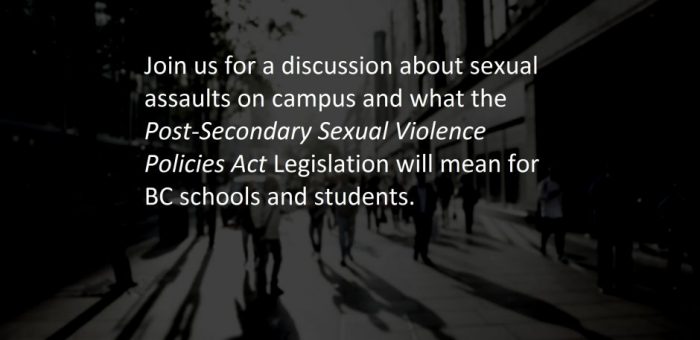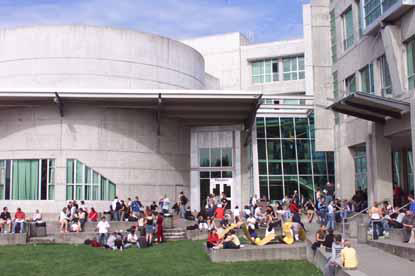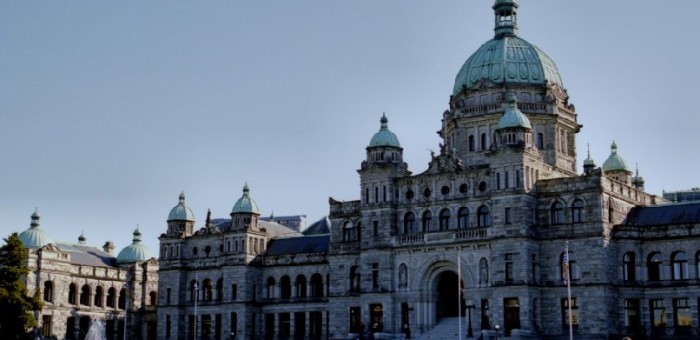Youth
MLA Town Hall: Sexual Violence on BC Campuses
MLA Town Hall: Sexual Violence on BC Campuses
On Wednesday, May 4th 2016 we will be hosting an MLA Town Hall on sexualized violence on BC campuses with a panel of frontline speakers and experts. The event will start with a talk from MLA Andrew Weaver about his legislative efforts to address this issue, as well as an update on the progress of his bill, the Post-Secondary Sexual Violence Policies Act. Following Dr. Weaver, each panelist will speak about their connection to the issue as well as their ongoing efforts to prevent and address instances of sexual assault.
Panelist will include:
- The Victoria Sexual Assault Centre
- The UVic Student Society
- Trauma Therapist Barbara Allyn
- TRU Student Jean Strong
Plenty of time will be reserved for questions, comments, and discussion about how we can tackle this incredibly important issue and what the legislation will mean for BC post-secondary schools and students. This is a topic that effects everyone in our community, and everyone is welcome to attend.
The event will take place from 7:00pm to 9:00pm at the University of Victoria, Student Union Building (3800 Finnerty Road), in the Vertigo Room. Doors will open at 6:30pm and seating will be on a first-come, first-serve basis.
Please feel free to circulate this invitation to other people or groups who may also have an interest in joining us. And for more information, don’t hesitate to contact our office by email: andrew.weaver.mla@leg.bc.ca by phone: 250 – 472 – 8528 or on facebook.
Should we Lower the Voting Age to 16? What do you think?
Background
One of the fundamental issues that motivated me to get into politics was that in my view, far too many of our political leaders are shortsighted in their decision-making. That is, too often political opportunism and the quest for re-election are the determining factors and primary motivators in a prevailing short-sighted and short-term political agenda. But that does not serve society well in the long run.
Let me give you three concrete examples.
- Recently, our premier suggested that the solution to the underfunding of public education lay with growing the economy. Fundamentally the B.C. Liberals have it backwards. A quality education is not the luxury of a strong economy. A quality public-education system is what builds a strong economy. Our society has thrived through innovation precisely because of the emphasis we have placed on education. The doctors, engineers, nurses and skilled labour of tomorrow — those who will take care of us as we age — are in the school system today. Surely it’s in all of our long term interests to ensure substantive short term investment in the society of tomorrow.
 We’ve all heard of the Dr. Suess book The Lorax, in which the Once-ler destroys the Truffula forest in a short-sighted quest to produce Thneed garments (“A-fine-something-that-all-people need”). In the end, with the forest gone, the Once-ler’s wealth and prosperity collapses and he lives a depressed life of solitude. The Lorax, published in 1971, beautifully articulates the result of short-sighted and unsustainable resource management. A Loraxian approach to resource management does not protect our renewable resources, natural environment or build public support. Yet this is the approach we are far too often taking in British Columbia, or frankly more broadly in Canada as a whole. It’s a bit like being given a great big inheritance, using that inheritance to throw a huge party, and then waking up the next day broke, with a wicked hangover and asking oneself “Now What?”.
We’ve all heard of the Dr. Suess book The Lorax, in which the Once-ler destroys the Truffula forest in a short-sighted quest to produce Thneed garments (“A-fine-something-that-all-people need”). In the end, with the forest gone, the Once-ler’s wealth and prosperity collapses and he lives a depressed life of solitude. The Lorax, published in 1971, beautifully articulates the result of short-sighted and unsustainable resource management. A Loraxian approach to resource management does not protect our renewable resources, natural environment or build public support. Yet this is the approach we are far too often taking in British Columbia, or frankly more broadly in Canada as a whole. It’s a bit like being given a great big inheritance, using that inheritance to throw a huge party, and then waking up the next day broke, with a wicked hangover and asking oneself “Now What?”.- Right now, it is in every person, in every household, in every municipality, in every city, in every province, in every country in the world’s best interest to do precisely nothing about global warming from a traditional cost-benefit point of view. That is because the costs of action are borne by the individual and the costs of inaction are distributed over 7 billion people in the next generation. Global warming is literally a textbook example of the Tragedy of the Commons with the atmosphere being the shared natural resource.The decisions we make today as to whether or not we put an increasing price on emissions will have profound consequences on the climate, natural and built environment, biodiversity and availability of water over the next century. Yet those making the decisions today will not have to live the consequences of the decisions they are making.
To summarize, most of the grand challenges of our time require decision-makers to look beyond the next election cycle and instead reflect upon the long-term consequences of their decisions. Dealing with poverty, homelessness and the increasing income disparity between the wealthy and the poor, or sustainable resource development, global warming and other environmental issues, or envisioning ways and means of moving towards more steady-state, diversified economies that aren’t subject to wild boom and bust cycles all require us to reflect upon the importance of intergenerational equity. This leads me to pose the following question:
Should the present generation also consider future generations in
the fiscal, social and environmental decisions we make?
I happen to think we do.
Yet herein lies the fundamental problem. Today’s decision-makers don’t have to live the long-term consequences of the decisions they make and those who do are either not allowed to, or are not participating in, our democratic institutions.
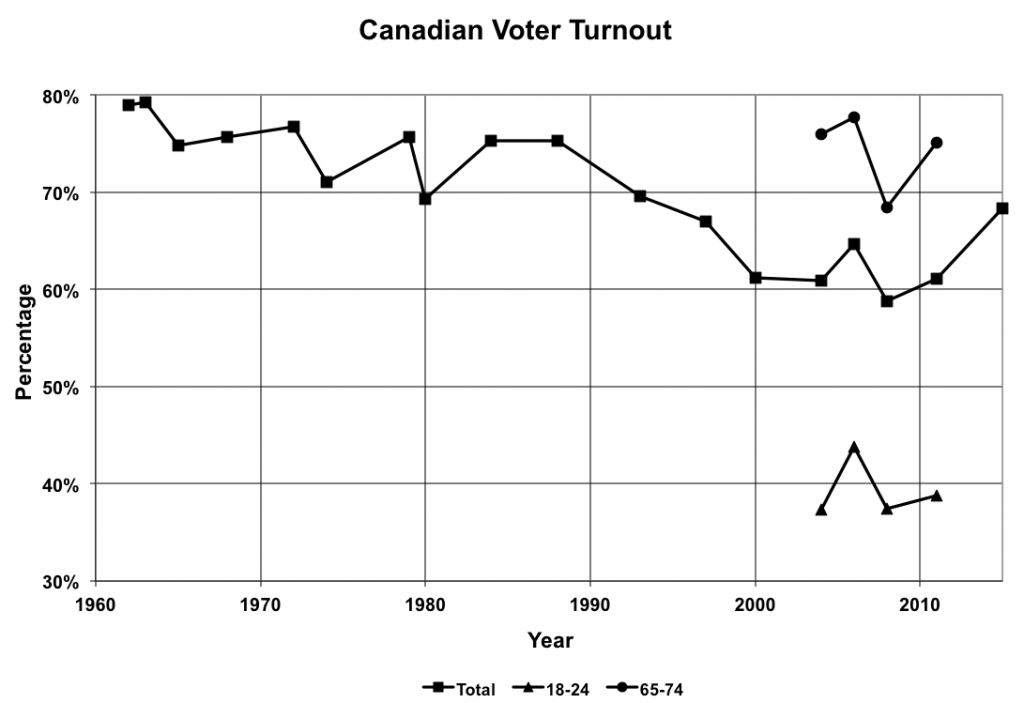 As shown in the figure above, upwards of 70% of seniors over the age of 65 have voted in our recent federal elections. Only around 40% of youth between the ages of 18-24 voted (age-related demographic data likely won’t be available until May for the 2015 federal election). Is it any surprise that many of our political leaders target their promises and messaging to a demographic that they know will vote. I’d wager that when the results become available, we’ll see that the youth participation rose in the 2015 election as it was clear that Prime Minister Trudeau and his Liberal team were discussing values that mattered to the youth of today.
As shown in the figure above, upwards of 70% of seniors over the age of 65 have voted in our recent federal elections. Only around 40% of youth between the ages of 18-24 voted (age-related demographic data likely won’t be available until May for the 2015 federal election). Is it any surprise that many of our political leaders target their promises and messaging to a demographic that they know will vote. I’d wager that when the results become available, we’ll see that the youth participation rose in the 2015 election as it was clear that Prime Minister Trudeau and his Liberal team were discussing values that mattered to the youth of today.
Voting Age History
The voting age was not always 18 in British Columbia and Canada. In fact, it wasn’t until 1970 that the Canada Elections Act was amended to drop the voting age from 21 to 18. In British Columbia we made the jump in two steps. First, in 1952 we dropped the voting age from 21 to 19, but it wasn’t until 1992 that we made the subsequent change to lower the age to 18.
 Around the world more and more jurisdictions are openly discussing the notion of dropping the voting age to 16. In fact, a growing number have actually done so. The most recent and notable example of this occurred in Scotland.
Around the world more and more jurisdictions are openly discussing the notion of dropping the voting age to 16. In fact, a growing number have actually done so. The most recent and notable example of this occurred in Scotland.
Scotland experimented by lowering the voting age in their September 18, 2014 independence referendum. They viewed it as being so successful that they subsequently permanently dropped the voting age to 16 in all future Scottish Parliament and local government elections.
The voting age in Brazil has been 16 since 1988; Austria changed its voting age to 16 in 2007; Argentina dropped the voting age to 16 in 2012. These are but a few of the growing number of jurisdictions that are either considering or already have dropped the voting age to 16 around the world.
The Justification
As I noted above, there has been a disturbing trend of low youth voter turnout in Canadian elections. The non-profit US-based NGO Fair Vote has noted that there is empirical evidence to suggest that “the earlier in life a voter casts their first ballot, the more likely they are to develop voting as a habit.” So while youth turnout might remain low, there is evidence to suggest that there will be increased participation. What’s more, each and every student in the province of British Columbia is required to take Social Studies 11 (or Civic Studies 11 or BC First Nation Studies 12) to fulfill their Social Studies graduation requirement. Unit 1 of the four-unit Social Studies curriculum in the 2005 Integrated Resource package is Politics and Government. While not yet finalized, Politics and Government remains as Unit 1 in the draft 2015 Integrated Resource package.
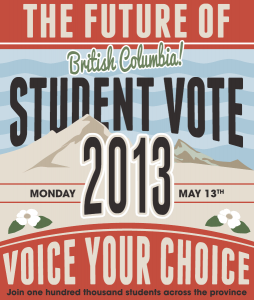 Social Studies 11 is a class taken when students are typically sixteen years old. It is an ideal time to engage students on the history and importance of voting. And this sort of experiential learning, wherein direct experience is inserted into the learning environment, has a rich history of validation since the early work of John Dewey in the 1930s. So giving students the ability to vote at the time they are learning about its importance, and knowing that the earlier a voter casts a first ballot, the more likely they are to be lifelong voter, almost certainly will lead to greater voter participation.
Social Studies 11 is a class taken when students are typically sixteen years old. It is an ideal time to engage students on the history and importance of voting. And this sort of experiential learning, wherein direct experience is inserted into the learning environment, has a rich history of validation since the early work of John Dewey in the 1930s. So giving students the ability to vote at the time they are learning about its importance, and knowing that the earlier a voter casts a first ballot, the more likely they are to be lifelong voter, almost certainly will lead to greater voter participation.
As I noted earlier, today’s decision-makers don’t have to live the long-term consequences of the decisions they make and those who do are either not allowed to or are not participating in our democratic institutions. We can do something about the former by reducing the voter age to 16. After all, the youth of day are the leaders of tomorrow and they should have a say in the direction we are heading as they will inherit what we leave them in the years ahead.
Having spent many years as an educator and having presented to, or engaged in discussions with, high school students and classes across British Columbia on numerous occasions, I find it difficult to accept an argument that students are not mature enough of informed enough at age 16 to vote. Students today have access to information like never before; they are tech savvy and they know where to go to get information if they need it.
And of course, there are numerous other arguments, one of the strongest of which is that many youth work and so pay taxes. Taxation without representation is generally counter to our democratic principles. That is, youth must pay the taxes but they are not allowed to vote for those who put in place laws that create them. Other compelling reasons include the fact that we already trust youth to drive at 16, they can get married at 16 (with parents’ permission) and you can drop out of school at 16. These are all pretty major life responsibilities that are entrusted upon our youth.
What do you think?
So tell me what you think? Should we lower the voter age to 16 in the province of British Columbia? There is a trend happening worldwide in the area. Should we lead the way or not? And if not, why not? If so, why?
Celebrating Canadian Interuniversity Sport Accomplishments by Women
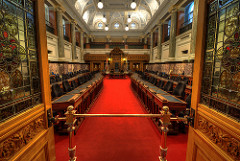 Today in the legislature I rose to celebrate the success of British Columbia women’s teams in the Canadian Interuniversity Sport championships. Below are the text and video of my statement.
Today in the legislature I rose to celebrate the success of British Columbia women’s teams in the Canadian Interuniversity Sport championships. Below are the text and video of my statement.
For information, a team being presented at the bar means the front doors to the chamber are opened and the team is brought in as far as the bar (shown in the image to the right). Introductions of individuals in the viewing gallery are frequently done.
Text of my Statement
Last week in the House, we were introduced to the UBC Thunderbirds, the winner of the 2015 Vanier Cup. The next day we celebrated the 99th anniversary of the adoption of legislation by this Legislature providing women the right to vote in B.C. On that day we celebrated how far we have come. These were indeed great events to celebrate. Today I’d like to expand the celebration of B.C.’s success in the Canadian Interuniversity Sports, or CIS sports championships.
In 2015, UBC’s women’s field hockey team won their fifth straight CIS championship. This year’s final game was a nail-biter. UBC was down 2-1 to the UVic Vikes with literally seconds left in the game when UVic was forced to defend not one but two penalty corners. UBC scored on the second penalty corner as time ran out and subsequently won the penalty shootout Both players of the game — UBC’s Sarah Keglowitsch and UVic’s Lizzy Lizzie — were from Shawnigan Lake. There must have been something in the water there.
In women’s soccer, 10 of the past 14 CIS championships have been won by B.C. universities, led by Trinity Western’s five titles, UBC’s four titles and UVic’s single title. UBC won this year’s final game 3-0 over the team from Trinity Western University.
UBC women’s volleyball team won six consecutive titles from 2008 to 2013. This past year three of the top four teams in the country were from B.C.: Trinity Western, UBC Okanagan and UBC. In women’s basketball, from 2002 to 2010, B.C. universities won nine consecutive national titles: SFU five, UBC three and UVic one.
In the last 20 years, precisely four teams have been presented at the bar: the B.C. Lions of 2006 and 2012, the Victoria Shamrocks in 2015 and UBC’s football team in 2016. As far as I can tell, a women’s sports team has never, ever before been presented at the bar. We still have a long way to go.
Video of my Statement
Addressing Sexual Violence on Post-Secondary Campuses
On March 8th I introduced Bill M205: Post-Secondary Sexual Violence Policies Act. This bill, based on similar legislation in Ontario, was designed to address the pervasive occurrence of sexualized violence plaguing universities, colleges and other post-secondary institutions in British Columbia. If enacted, it would create a legal responsibility for them to develop and maintain policies that would work to prevent the occurrences of sexual violence and provide support for victims. The act would allow university- and college-specific policies to be developed that would meet the needs of students, including education and protection, while working to create a safe environment for all students to come forward to report a sexual assault.
Today in the legislature I rose to question the Premier as to whether or not she supports the need for sexual assault policy legislation for post-secondary institutions. I was very pleased with the Premier’s response. Not only did she respond with a strong statement acknowledging the importance of this issue, but more importantly, the Premier noted the urgency with which we must act on it. She committed to work with me to bring the legislation forward in a timely manner. In fact she stated that her hope was that it would happen this session.
As noted in my press release (reproduced below), I am thrilled by the Premier’s response and welcome the opportunity to work with her, and with students across the Province, to ensure campuses become safer places. I want to thank the Premier for her willingness to make this important issue a priority.
It would not be appropriate for me to take full credit for the introduction of this bill. I am incredibly fortunate to work with exceptional people who helped with its development. I am indebted to Claire Hume, Stefan Jonsson, Evan Pivnick, Aldous Sperl and Mat Wright for their efforts in this regard. In addition, I am very grateful to Brontë Renwick-Shields, Kenya Rogers, Jean Strong and the Victoria Sexual Assault Centre, for their willingness to educate me on the importance of this issue. Finally, and collectively, we all owe a debt of gratitude to the incredibly courageous survivors of sexualized violence who had the courage to speak out.
Below I reproduce both the text and video of my Question Period exchange with the Premier.
Question
A. Weaver: Last Tuesday the Premier told News 1130 that she acknowledged more needs to be done to support the survivors of sexual assault on B.C. post-secondary campuses. The Premier stated:
“Rape kits need to be available, trained staff need to be available, and some universities and colleges are doing a more thorough job than others. So the Minister of Health is going to go out and have that conversation, because we have to make sure that help is available.“
I fear that the Premier may have missed the larger point about the conversation we need to have. With respect, we don’t just need more rape kits. We need to take this issue head on, recognize that our post-secondary campuses aren’t always providing a safe environment for B.C. students, and we need to have a plan in place to prevent assaults from happening in the first instance.
When the University of Ottawa surveyed its student body last year, it found that 44 percent of female students experienced sexual violence or unwanted sexual touching while attending the university. I’m asking the government to take a clear leadership role and make a clear statement that this is a responsibility they will act upon.
To the Premier, does she support the need for sexual assault policy legislation for post-secondary institutions?
Premier’s Response
Hon. C. Clark: Being raped is one of the worst things that can happen to any woman, whether that is intimate-partner assault, whether that’s sexual abuse at the hands of a family member or whether it’s an assault from a stranger. Any woman who has experienced it will tell you that it leaves a lifetime of scars.
We hope for women who are raped that they can find a way to heal, and many do. Some will say they became stronger as a result. But all women who have been sexually assaulted are changed.
It’s something that should not be happening in our society. Sadly, it appears to be more prevalent on university campuses than most other places in our society. There is more that we can do and more that we should do.
The Minister of Advanced Education has begun that work. I certainly welcome the interest of the member from Oak Bay. I’ve had a chance to look at his bill, Bill M205, and I’d certainly look forward to working with him on finding a way that we can either pass this bill or amend it and pass a similar version to it in our Legislature.
We need to do more to protect women on campus from sexual assault because these life-changing, traumatic events don’t need to happen. As a society, we can and we must do more to prevent them.
Supplementary Question
A. Weaver: Thank you to the Premier for her response. I’m very pleased to hear this. As the Premier and government will know, without a legislative requirement to develop a policy, we risk continuing the status quo where institutional optics are sometimes allowed to trump student safety.
For example, a student at Thompson Rivers University, who was recently assaulted twice in one term, was told: “Maybe you would be better suited to a different school.” UBC made headlines last year when it turned out that reported cases of sexual assault on their campus were less than a quarter of those reported by the UBC RCMP detachment. Just yesterday, at the University of Victoria, a student noted that she felt “completely invalidated and silenced” by a UVic investigation into her sexual assault.
Addressing this has to be about our institutions, our students and not post-secondary institutions. My question to the Premier is this: what is the timeline for government to introduce such legislation?
Premier’s Response
Hon. C. Clark: I can’t give a definitive timeline today, except to say that I recognize, along with the member, that this is an urgent issue. A rapist’s best friend is silence. A rapist’s best friend is shame. A rapist’s best friend is the failure of authorities to recognize a complaint when it comes forward and fail to act on it.
We will not reduce the prevalence of sexual assault until we strengthen the institutions that are there to protect women, until we ensure that women feel safe coming forward and saying that they have been sexual assaulted. They will only do so when they have the knowledge that someone will act on what they’ve told them and keep them safe.
We have much more to do, and I welcome the member’s active interest in this. I thank him for presenting his bill. We will work with him on it on an urgent basis and try and get something passed with respect to changing policy as soon as we possibly can.
Video of Question Period
Media Release
Media Release: March 16, 2016
Premier pledges to work with Andrew Weaver to pass Post-Secondary Sexual Violence Policies Act
For Immediate Release
Victoria B.C. – In response to a question from Andrew Weaver, Leader of the B.C. Green Party and MLA for Oak Bay-Gordon Head, the Premier pledged that her government would pass his Private Member’s Bill, or develop comparable legislation to address the prevalence of sexual assaults on post-secondary campuses.
“This is a strong statement from the Premier and her government that they acknowledge the importance of this issue,” says Weaver. “Most importantly, the Premier acknowledged the urgency with which we must act on this issue and has committed to work with me to bring forward legislation in a timely manner.”
“I am thrilled by the Premier’s response and welcome the opportunity to work with her, and with students across the Province, to ensure campuses become safer places,” notes Weaver. “Sexualized violence affects everyone in our communities, regardless of gender identity.”
Andrew Weaver tabled the Post-Secondary Sexual Violence Policies Act, 2016 last Tuesday. The Bill, if passed, would create a legal responsibility for every University and College in B.C. to develop and maintain policies that would provide education for students, support for survivors and would work to prevent the occurrences of sexual assault on campuses.
There have been several highly publicized incidents in the news lately. When a student at Thompson Rivers University was sexually assaulted twice in one term she was told ‘Maybe you would be better suited to a different school.’ UBC made headlines last year when it turned out that their reported cases of sexual assault on campus were less than a quarter of those reported by the UBC RCMP detachment. Earlier this week it was reported that a UVic student felt ‘completely invalidated and silenced’ by a UVic investigation into her sexual assault.
“We can’t know the actual scale of the problem unless we have post-secondary institutions honestly reporting about it,” says Weaver. “Based on the little data available, and the widespread culture of under reporting that exists, any post-secondary institution that takes this issue on seriously would likely see their reported assaults far exceed other institutions. No public institution wants to have that negative attention; they want to be seen as safe places for students to study.”
“A legislated approach is required to ensure best practices and consistent standards are met, while establishing a clear legal responsibility for post-secondary institutions to maintain these policies,” said Weaver. “I want to thank the Premier for her willingness to make this important issue a priority”.
– 30 –
Media Contact
Mat Wright – Press Secretary Andrew Weaver MLA
1 250 216 3382
mat.wright@leg.bc.ca
24th Vancouver Island Youth Parliament March 11 – 13, 2016
Vancouver Island Youth aged 14 to 18 are invited to apply to attend the 24th Vancouver Island Youth Parliament (VIYP), sponsored by the British Columbia Youth Parliament. This year, VIYP will be hosted at the University of Victoria and will run from March 11th to 13th, 2016.
The VIYP gives youth in our community an opportunity to learn about parliamentary procedures, debate Private Members Resolutions and build friendships by connecting with other youth who are passionate about our democracy and the critical issues that we face in society. In addition, VIYP intends to further its presence in the community by becoming more involved in service projects throughout the region.
VIYP is a non-profit, non-partisan youth organization that recognizes every young person’s potential to lead and serve in their community. VIYP’s aim is to provide a forum in which youth can develop skills in leadership, public speaking and the parliamentary process. These skills can then be put into practice through service to youth and the community. VIYP recognizes the significant abilities of youth and provides a forum in which youth can have their voices heard on issues that matter.
Each year, youth are “elected” to become members of VIYP as representatives of their schools or community organizations. You can find out more about the opportunity and application process by visiting their website.
Applications must be received by March 8, 2016.

